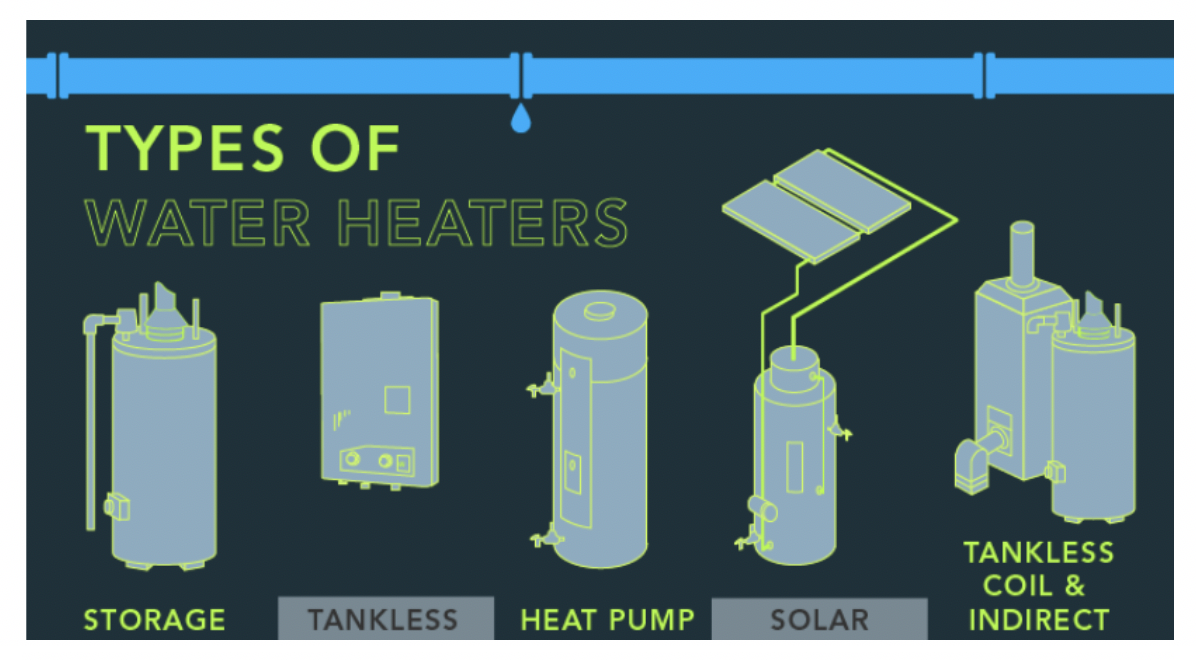High-Efficiency Water Heaters
Existing CommercialWhat are High-Efficiency Water Heaters?
High-efficiency water heaters provide an energy-efficient method of supplying domestic hot water in commercial buildings. Figure 1 shows several different types of water heaters, including storage, tankless, heat pump, solar, and tankless coil, and indirect water heaters.

Figure 1. Types of water heaters. (Source: US DOE Energy Saver 101: Water Heaters)
Conventional, storage water heaters hold hot water in a tank, while tankless water heaters only heat the water upon demand. Heat pump water heaters use electricity to transport heat from one source to another (e.g., air-source heat pumps, geothermal heat pumps) instead of providing heat for hot water directly (see Geothermal Heat Pumps).[1] Solar water heaters utilize the sun’s heat and tankless coil, and indirect water heaters use a building’s heating system to provide domestic hot water (see Solar Thermal Systems).
Recirculation pump systems are another energy-efficient water heating technology often used in commercial buildings. These systems use small pumps combined with a looped system of hot water piping to constantly recirculate hot water from a conventional tank to points of common usage such as faucets and save energy by heating water only on when needed.
Typical energy sources for high-efficiency water heaters include natural gas, propane, electricity, and solar. The availability and cost of any of these sources or combinations of these sources can dictate equipment and system selection along with other selection criteria including the building’s hot water requirements such as usage times, amount of water use, temperature range, and flow rates.
How to Incorporate a High-Efficiency Water Heater
Selecting a high-efficiency water heater is part of a whole building water conservation strategy to reduce indoor water consumption by specifying water-efficient fixtures, equipment, systems, and processes (see Indoor Water Conservation). Work with experienced and knowledgeable commercial water heater professionals to navigate the marketplace of available high-efficiency water heaters to find the best water heater model or system to supply hot water reliably, while saving energy and costs.
For example, natural gas tankless water heaters can be installed at a central location in the building or at a specific point of use, such as a bathroom or laundry room to supply hot water needs for that specific location. A large gas-fired unit installed at a central location supplies all the hot water needs for a small commercial facility. In contrast, installing several small, redundant water heaters offers flexibility in meeting varying levels of hot water demand (see Part-Load Efficiency).
Check the New Jersey Office of Clean Energy for available incentives and consult the list of Energy Star qualifying products, available at the Consortium for Energy Efficiency (CEE) or Air-Conditioning, Heating, and Refrigeration Institute (AHRI) online databases.
Benefits
High-efficiency water heaters use less energy than a standard water heater, primarily by taking less time to heat water, which in turn translates to fewer carbon emissions and lower utility bills.
Costs
High-efficiency water heaters have higher upfront costs than standard water heaters but provide long-term cost savings through reduced energy costs. The Federal Energy Management Program (FEMP) purchasing guidelines for high-efficiency water heaters recommends purchasing an ENERGY STAR Certified commercial gas water heater if it is priced no more than $284 above the less efficient model.[2] Figure 2 compares three types of water heaters at varying levels of efficiency and calculates the lifetime cost savings associated with each model type.
Resiliency
High-efficiency water heaters contribute to resiliency by decreasing energy consumption, including peak loads, which decreases reliance and stress on fuel sources and energy infrastructure.
Air-Conditioning, Heating and Refrigeration Institute (AHRI) Online Database
Consortium for Energy Efficiency Directory of Efficient Equipment
[1] US DOE. 2018. Heat Pump Water Heaters. https://new.usgbc.org/leed-v41#bdc (accessed January 24, 2019).
[2] US DOE Federal Energy Management Program. 2018. Purchasing Energy-Efficient Commercial Gas Water Heaters. https://www.energy.gov/eere/femp/purchasing-energy-efficient-commercial-gas-water-heaters (accessed January 25, 2019).
